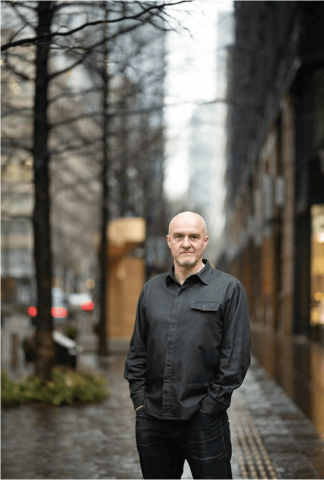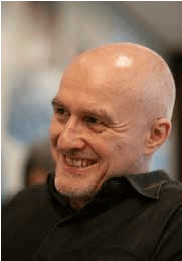Issue:

Gavin Blair
Freelance
By David McNeill
When Gavin Blair was 14 he discovered karate and was hooked. His first sensei was his next door neighbor’s woodwork teacher in the then rough and tumble neighborhood of Streatham, South London. It was one of those serendipitous moments in life that only becomes clear much later. “If he’d been a kung-fu teacher I might have ended up in Hong Kong,” says Blair, laughing.
As it happens, Japan beckoned and karate was the lure. Blair had just finished a Masters degree in sports and exercise psychology at Exeter University (partly paid for with compensation from a violent doorstep mugging) and was working as a cycle courier in London when an old sparring partner wrote to him from Yokohama. He could earn a living teaching English and train in the world’s best dojos, he told him. What had he got to lose?
Blair hopped on a plane in 1997 and has been here since.
His first job was at a private English language school in Sagamihara but much of his spare time was spent wearing a gi. Like many expats, the initial plan was to stay for a year, but one by one his friends drifted home while Blair stayed and eventually got married. “Time started passing and I thought maybe I’d be here for a while,” he says. So he began freelancing, filing music and film reviews for local magazines.
“The only talent I had at school was writing,” explains Blair during an interview at the FCCJ. He found he was deft at supplying copy on demand and could earn decent money, especially on business stories. Advertorials paid the best, but he could turn his hand to most other yarns too. “It got to the stage where I thought I could make a living if I concentrated.”
Blair’s other line of work was helping to operate a small chain of English schools. He subsequently bought one of the franchises and ran it for 14 years (he recently sold it). “I was running that school, managing the others, writing and had a kid. It was ridiculous so I stopped managing the chain.”
Gigs with The Christian Science Monitor, South China Morning Post, The LA Times, and The Hollywood Reporter. He subs for The Times and The Guardian when their correspondents are off duty. Add in various trade and niche publications (vaping!), market research, TV work, translating and advertorials and it’s clear that Blair is one of the busiest English language freelancers in Tokyo.
Among his more memorable scoops was bagging interviews with brainbox American filmmaker Steven Soderbergh (“he speaks in perfect paragraphs”) and a yakuza boss, who was arrested right after the piece was published, recalls Blair. “But we stay in touch.” Unfortunately, he laments, journalists often do best when others are suffering, recalling his time in March and April 2011 covering the Tohoku disaster for The Christian Science Monitor and Global Post and lots of TV and radio.
AMONG HIS MORE MEMORABLE SCOOPS WAS BAGGING AN INTERVIEW WITH A YAKUZA BOSS, WHO WAS ARRESTED RIGHT AFTER THE PIECE WAS PUBLISHED. “BUT WE STAY IN TOUCH.”

An entrepreneurial streak and the discipline he derives from decades of physical training drives his work. He is writing a book about samurai and has previously published several others: Zen in Japanese Culture and Japan in 100 Words: From Anime to Zen. Next up, he hopes, is his “dream project” a monograph on martial arts from around the world.
Inevitably, some of these assignments are more enjoyable than others, he says. “I can do a decent news feature and it pays $350 and that’s pretty good these days. It takes at least a day but doesn’t really cover my time. An advertorial can pay ten times that.” This bothers him “on an intellectual and political level” but “without a doubt that other work subsidizes journalism.”
The secret to a successful freelance career is to be flexible, he says. “Don’t be fussy about what you write but don’t work for free.” Once rates go below a certain point, he says, he puts his foot down. “I can understand people starting out and trying to get their name out there but you can’t keep that up. It’s going be more and more difficult to make a living.”
The fact that many newspapers are gutting their foreign news departments obviously doesn’t help, Blair says. “Nobody thinks it’s a healthy business model at the minute. Having said that I still feel absolutely blessed to do what I do I get to write about things I like in a place I like.”
The karate hasn’t gone away. It’s 35 years since Blair first began practicing his kata but he reckons he still trains five or six days a week between the karate, Brazilian jiujitsu, which he started a couple years ago, and conditioning work “at least 12 hours a week. ” He’s has had the same sensei for two decades and coaches himself at Azabu University. And he’s still making a living writing in Tokyo. Not bad for a boy from Streatham.
David McNeill writes for the Irish Times and The Economist, and teaches media literacy at Hosei and Sophia universities.

